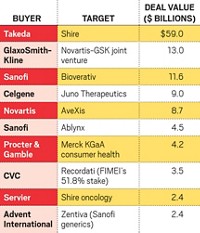Advertisement
Grab your lab coat. Let's get started
Welcome!
Welcome!
Create an account below to get 6 C&EN articles per month, receive newsletters and more - all free.
It seems this is your first time logging in online. Please enter the following information to continue.
As an ACS member you automatically get access to this site. All we need is few more details to create your reading experience.
Not you? Sign in with a different account.
Not you? Sign in with a different account.
ERROR 1
ERROR 1
ERROR 2
ERROR 2
ERROR 2
ERROR 2
ERROR 2
Password and Confirm password must match.
If you have an ACS member number, please enter it here so we can link this account to your membership. (optional)
ERROR 2
ACS values your privacy. By submitting your information, you are gaining access to C&EN and subscribing to our weekly newsletter. We use the information you provide to make your reading experience better, and we will never sell your data to third party members.
Finance
Major drug firms have active first half of 2019
The year so far has brought steady sales growth and robust dealmaking
by Lisa M. Jarvis
August 8, 2019
| A version of this story appeared in
Volume 97, Issue 32
Big pharma firms reported steady revenues for the first half of the year. But beneath that calm, they have been working furiously to reshape their businesses for future survival. The period was marked by divestments and acquisitions meant to strengthen their research engines.
In flux

Several firms are grappling with patent losses on top-selling products. For example, revenues are flagging at AbbVie because of its reliance on the arthritis treatment Humira. Although Humira won’t see generic competition in the US until 2023, biosimilar launches in Europe caused sales of the drug to decline nearly 32% in the first 6 months of 2019, to $9.3 billion.
AbbVie is counting on its recently announced acquisition of Allergan to breathe life back into its business. The $63 billion deal gives AbbVie a portfolio of specialty pharmaceuticals, including the lucrative wrinkle eraser Botox.
The purchase of Allergan is among the largest in a wave of transactions in the industry this year. Many firms are striking deals to boost their presence in the oncology sector. Bristol-Myers Squibb is in the process of buying Celgene, Pfizer is acquiring Array BioPharma, Eli Lilly and Company acquired Loxo Oncology, and GlaxoSmithKline purchased Tesaro.
Other moves are intended to help big pharma companies sharpen their focus on inventing medicines. After years of tacking on noncore units with small but sustained revenue streams, firms have spent the last two years getting rid of those businesses. For example, Lilly divested the rest of its interest in the Elanco animal-health business and Pfizer said it would merge its generic drugs business with Mylan.
Pfizer created a consumer health joint venture with GlaxoSmithKline last year, and the two deals will allow Pfizer to be “singularly focused on innovative biopharma,” CEO Albert Bourla told investors on a recent earnings call. “Our product portfolio and pipeline will more easily move the needle in terms of growth impact given the smaller size, which will also make the growth more sustainable.”




Join the conversation
Contact the reporter
Submit a Letter to the Editor for publication
Engage with us on Twitter